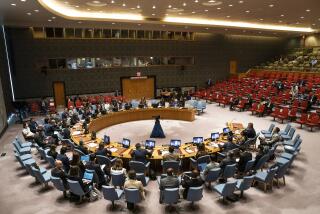Soviets Place Large Order for U.S. Wheat
- Share via
WASHINGTON — The Soviet Union has agreed to buy 4 million metric tons--about 147 million bushels--of American bread-quality wheat this year, Agriculture Secretary Richard E. Lyng announced Thursday.
The sale--equivalent to about half of last year’s crop in Kansas, the No. 1 wheat state--will be carried out under a U.S. export-subsidy program designed to recapture markets lost to subsidized competition, principally from the European Economic Community.
Lyng said he found it “troublesome” that the United States was forced to resort to subsidization of farm exports. But, he added, “the important thing here to me is that we are being comp1702127988Soviets, we must be competitive.”
The secretary would not speculate on the size of the subsidy, but at current prices the sale could mean roughly $376 million to U.S. farmers. The deal will be carried out by private exporters who will be given grain from Agriculture Department surpluses to make up for lower prices they offer the Soviets.
Kremlin wheat buyers rejected a similar subsidized sale offer from the Reagan Administration last fall, contending that the U.S. price remained higher than the world market. France, a member of the EEC, subsequently made a major deal with the Soviets at more favorable rates.
“We were not competitive on wheat,” Lyng said. “We tried last year, too late, and perhaps not as well as we should have, looking back on it.”
Complaints About High Prices
Although Moscow is obligated to buy 4 million tons of wheat each year under a long-term grain agreement with this country, Soviet buyers have complained about high prices here and refused to buy. Last year they bought only 200,000 tons of wheat, and this year they had bought none.
Subsidized sales to the Soviets have been opposed by some Cabinet-level officials, most notably Secretary of State George P. Shultz. The Administration in recent weeks had been under increasing pressure from Republican farm-state legislators to renew the offer.
One of those who pressured the Administration, Rep. Pat Roberts (R-Kan.), from a major wheat-producing district, said Lyng’s announcement was “a breakthrough, and it represents a lot of hard work on the part of myself and others to convince the Administration to go down this road.”
Rumors of a pending deal with Moscow have rippled through the grain trade for more than a month, but Administration officials regularly denied that the United States had made a new offer to the Soviets. Lyng and Undersecretary Daniel G. Amstutz said Thursday that a U.S. offer was made in March.
Factors Leading to Sale
Amstutz, the department’s chief trade official, said the prospect of better prices and the likelihood that their own winter wheat crop has suffered weather damage were factors in the Soviets’ decision to buy U.S. grain.
The subsidized deal, representing about 4% of annual volume of world wheat trading, is virtually certain to draw new criticism from other U.S. customers, such as Japan, who have sought more favorable terms, and from other nations competing with the United States for export-market shares.
Lyng alluded to that during a news briefing, saying he would have preferred not to announce the sale on the same day that Japanese Prime Minister Yasuhiro Nakasone was visiting the White House. But, he said, since the Soviets agreed to the deal Thursday he preferred to announce it formally rather than have the news leak out.
More to Read
Sign up for Essential California
The most important California stories and recommendations in your inbox every morning.
You may occasionally receive promotional content from the Los Angeles Times.













